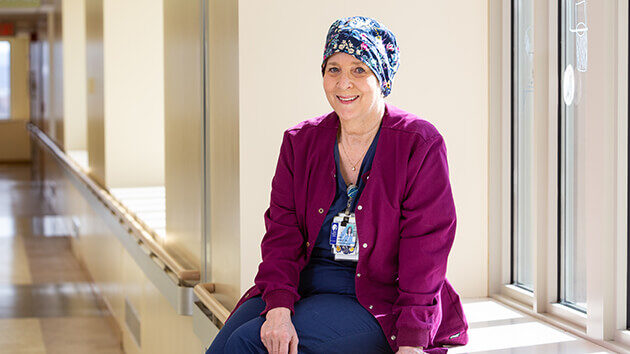Labor of Love Albany Medical Center’s Longest-Serving Nurse Shines Bright in The Birth Place

From a very young age, June Schalit, BSN, loved babies. “I was always fascinated with them, starting with my little brother, who was three and a half years younger than I was.” An avid babysitter before she reached her teens, Schalit jokes that her mother “had me on call.”
It was good training for a woman who would go on to be a nursing mainstay in Albany Medical Center’s Labor and Delivery Department and, as a preceptor, prepare hundreds of nurses for successful careers in women’s health. Today, with 50 years of caregiving experience under her belt, Schalit is Albany Medical Center’s longest-tenured nurse.
“My coworkers will sometimes ask me, ‘How come you’re still working?’ I’ll be 70 in June. I like to work,” she said. “I love the variety. Every day is different here.”
Schalit came to Albany Medical Center in 1970 as a nursing assistant. She was 19 years old. “I started on the oncology unit,” she said. “My son was a baby at the time, and some of the patients I was caring for were at the end of life.” The experience, she said, gave her a crash course in the gravity of the human experience. “I learned so much.”
When an opening came up in the antepartum unit, Schalit made a move. Over the next several years she worked in both the Neonatal Intensive Care Unit and Labor and Delivery—an area where she has stayed and spread her wings, serving in many roles, including assistant nurse manager, head of bereavement, and a longstanding member of the hospital Protocol and Ethics Committees.
She has seen The Birth Place transform into a very complex care center during her tenure. “We care for a lot of patients with high-risk pregnancies now,” she said. “We’ve become a referral center for those moms, because of our specialists and resources.” And while she has been witness to plenty of other changes in birthing care over the years—better pain options for patients; a rise in breastfeeding; shorter hospital stays—the basics, she said, are still the same.
“Our patients still need support,” she said. “And we still rely on teamwork to bring them the best possible care.”
Schalit advises her nursing students to spend as much time as possible at the bedside with patients. “Be kind to everyone,” she tells them, “and don’t forget to include the significant other—the father, the partner or the friend—who is there with mom. There can be a lot of teachable moments, depending on what’s happening with the labor.”
Her advice to new moms?
“This probably sounds obvious, but try to get enough rest. You don’t have to be superwoman. When people offer to help, take it.”
The care Schalit has provided to patients over the years has often led to friendship. Her best friend is a former patient. “We bonded when I was taking care of her and, months later, we bumped into each other,” she said. “She invited me over to see the baby, I brought my son, and the rest is history.”
Recently, Schalit cared for a woman who had a “rainbow baby”—a child born after a miscarriage or infant loss.
“We know a patient’s history coming in, so I was sensitive to her needs and how she might be feeling,” she said. “She did great, and I was so touched when she reached out to me on Facebook later. She’s been sending me pictures of the baby. She told me she couldn’t have done it without me. That makes it all worthwhile.”